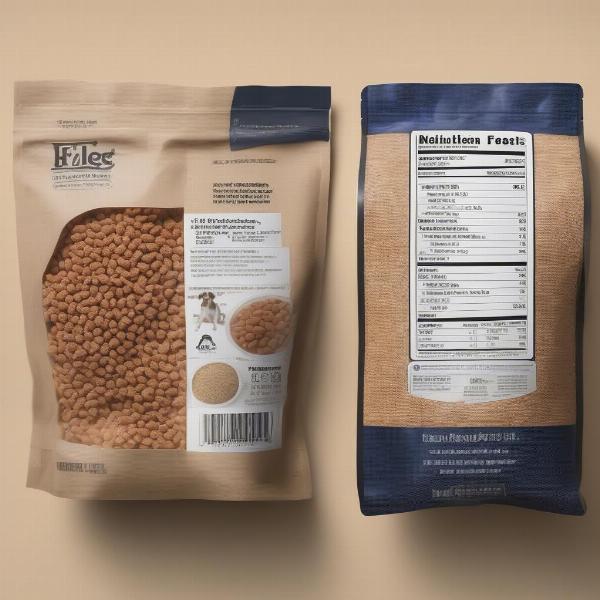Logic dog food is a term that resonates with dog owners who prioritize their furry friend’s well-being. It encompasses the idea of making informed decisions about canine nutrition, moving beyond simply filling a bowl. This means understanding ingredients, considering your dog’s individual needs, and selecting food that supports their overall health and happiness. From puppyhood to senior years, choosing the right food plays a crucial role in a dog’s vitality. Let’s explore the logic behind dog food choices and how to make the smartest decisions for your beloved pet.
Understanding the Logic Behind Dog Food Choices
Choosing dog food can feel overwhelming with countless brands and formulations available. The key is to apply logic by focusing on your dog’s specific needs. Consider their age, breed, activity level, and any health conditions. Puppies require different nutrients than adult dogs, and a senior dog’s dietary needs will differ again. Similarly, a highly active working dog will need a more calorie-dense food compared to a less active lap dog.
Breed-specific formulas also exist, addressing the unique predispositions certain breeds have to particular health issues. For example, large breed puppies need carefully balanced calcium and phosphorus levels to support healthy bone growth and prevent skeletal problems. Understanding these nuances helps you apply logic to your dog food choices, ensuring your furry friend receives optimal nutrition.
Decoding Dog Food Labels: A Logical Approach
Ingredient labels can seem like a foreign language. However, with a logical approach, you can decipher the essential information. Look for the guaranteed analysis, which provides the minimum percentages of protein, fat, fiber, and moisture. Prioritize high-quality protein sources, like meat and poultry, as the first ingredients. Avoid fillers like corn, wheat, and soy, which offer little nutritional value.
 Comparing Dog Food Ingredients for a Logical Choice
Comparing Dog Food Ingredients for a Logical Choice
Logical Dog Food for Different Life Stages
Each life stage presents unique nutritional requirements. Applying logic means tailoring your dog’s food to these specific needs.
Puppy Power: Fueling Growth
Puppies need food specifically formulated for their rapid growth and development. Puppy food is typically higher in calories and protein to support muscle and bone development.
Adult Adventures: Maintaining Optimal Health
Once your dog reaches adulthood, their dietary needs shift to maintaining optimal health and weight. Adult dog food offers balanced nutrition to support energy levels and overall well-being.
Senior Serenity: Supporting Golden Years
As dogs age, their metabolism slows down and their dietary needs change again. Senior dog food often contains lower calories and added joint support supplements to address age-related issues.
Addressing Common Concerns with Logic
Many dog owners face specific dietary challenges with their pets. A logical approach, often in consultation with a veterinarian, can help address these concerns. Food allergies, sensitive stomachs, and weight management are all areas where a logical selection of dog food can make a significant difference.
Conclusion: The Logic of Happy, Healthy Dogs
Choosing logic dog food isn’t just about selecting a brand; it’s about understanding your dog’s individual needs and making informed decisions. By applying logic to your dog food choices, you provide the foundation for a happy, healthy life for your beloved companion. Remember, choosing the right food is an act of love, and a little logic goes a long way.
FAQ
- What does “logic dog food” mean? It means making informed decisions about your dog’s nutrition based on their specific needs and the quality of ingredients.
- How do I choose the right food for my puppy? Look for puppy-specific formulas that are high in protein and calories to support growth.
- What should I feed my senior dog? Choose senior dog food with lower calories and added joint support.
- What if my dog has food allergies? Consult with your vet and look for hypoallergenic or limited ingredient diets.
- How can I tell if my dog’s food is high quality? Check the ingredient list for high-quality protein sources and avoid fillers like corn and wheat.
- What is the importance of a balanced diet for dogs? A balanced diet ensures your dog receives all the necessary nutrients for optimal health and well-being.
- How often should I feed my dog? Follow the feeding guidelines on the dog food packaging and consult your vet for personalized recommendations.
ILM Dog is a leading international website dedicated to providing expert advice on all aspects of dog care and breeding. We offer reliable, practical information for dog owners of all experience levels, covering topics from breed selection and health care to training, nutrition, and grooming. We strive to empower dog lovers worldwide with the knowledge they need to nurture the special bond they share with their canine companions. Contact us for expert advice and resources: Email: [email protected], Phone: +44 20-3965-8624. ILM Dog is committed to helping you provide the best possible care for your furry friend.